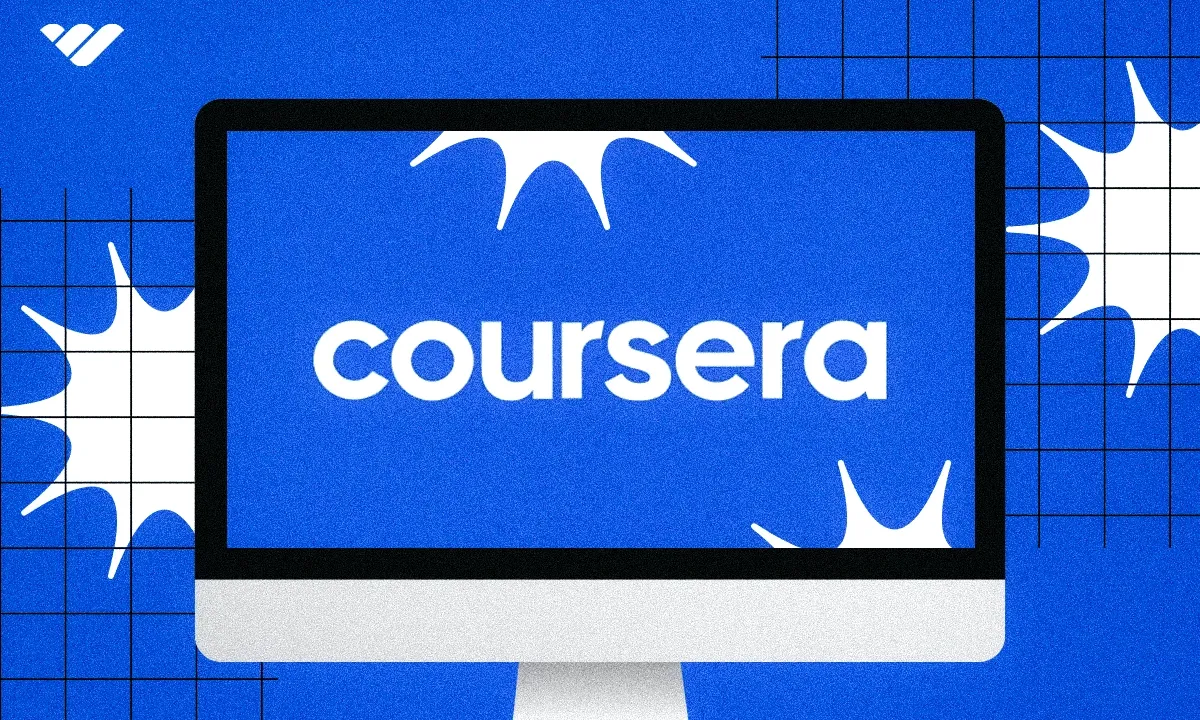Can you cash in on Coursera? Whop’s Coursera review looks at the options for creators to earn on the popular e-learning platform.
Key takeaways
- Coursera limits course creation to partner institutions and approved Project Network instructors, not independent creators.
- The affiliate program offers 10-45% commission on courses and may be the most accessible monetization route for creators.
- Individual creators seeking to monetize courses should consider alternative platforms like Whop that welcome all instructors.
Coursera is one of the biggest and best-known platforms in the world of online learning.
With its high-profile partners across the education and business sectors, students worldwide flock to Coursera for academic qualifications and career skills.
But can it work for creators and entrepreneurs?
Here, we take a deep dive into the limited ways you can make money on Coursera, including course creation, teaching, and its affiliate program.
We also suggest some alternative platforms and highlight why Whop ticks all the boxes when it comes to making money in the lucrative e-learning space.
An overview of Coursera

Since 2012, this California-based e-learning company has offered access to 100% online courses from global colleges, universities, and organizations.
Over that time, it has expanded its offering beyond standalone courses to professional certificates and even full degrees.
It claims to have provided courses to 113 million learners worldwide and developed partnerships with over 7.5k educational institutions, companies, and government bodies.

To put Coursera’s success into context, its own forecasts suggest it will make revenue of between $690m and $694m in 2024. Meanwhile, the total global e-learning industry is expected to exceed $185bn in revenue for the year, according to eLearningStats.education. So, it’s a significant player.
But can you make money on Coursera? We start our review of your options with a look at the potential for creating Coursera courses.
Who can create courses on Coursera?
If you’re a course creator, the main thing to understand about Coursera is that it’s not a platform where anyone with knowledge to share can sign up and start attracting paying students.
There are lots of platforms – like Whop – which are great for individuals to host and monetize courses. However, Coursera mostly offers courses from recognized institutions and organizations.
That being said, select business owners who are not associated with colleges and universities can provide professional skills courses on Coursera too, thanks to their partnership program.
We’ll cover this option in more depth later in this Coursera review.
Can you sign up to teach a course on Coursera?
Again, Coursera does not really offer a viable route to earning money as an online tutor or teacher.
Its courses are mostly taught by professionals working for Coursera’s partner institutions. These institutions set the syllabus, with Coursera providing the learning infrastructure.

However, there is one main exception that offers a route for individual creators – the Coursera Project Network.
Read about how to create and monetize a course with Whop.
What is the Coursera Project Network?
The network comprises a group of independent instructors from academia and industry with specific skills and experience. The courses they teach are Guided Projects.
Introduced in 2020, this course offering stands apart from other Coursera options, both in terms of content and teaching format.
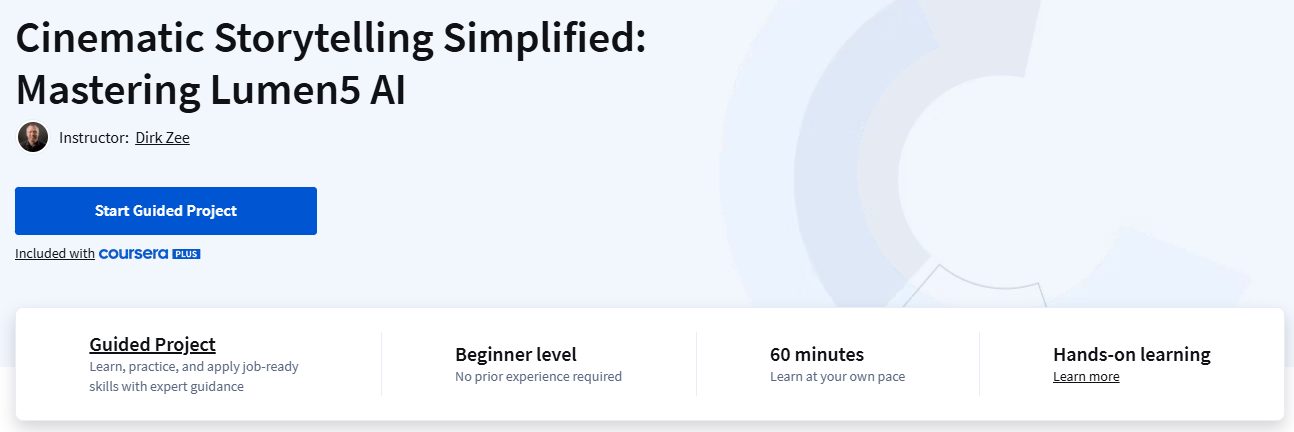
Lasting up to two hours, the projects offer an introduction to a subject or teach a specific skill. As the name suggests, they offer a coached teaching experience which gives learners a practical grounding.
It works as a split screen, so learners work through the project alongside the tutor's videos. The videos are pre-recorded and available to students on demand.
Learners who complete the course get a certificate, which can be downloaded and shared on LinkedIn and elsewhere. There are free Guided Projects, with the paid courses priced at $9.99.
What subjects do Guided Projects cover?

The subjects mostly cover business, marketing, and computing/tech topics. There is an emphasis on helping people get up to speed on AI and Machine Learning tools.
You can find beginner, intermediate, and advanced projects. To give you an idea of what this really means, here’s an example of each:
🎓 Develop a Company Website with Wix (beginner)
🎓 🎓 Create a Storyboard using Canva (intermediate)
🎓 🎓 🎓 Semantic Segmentation with Amazon Sagemaker (advanced)

Each course indicates if students need specific knowledge or experience to get the most from the project.
Remember, these are hands-on projects. So, the courses all involve walking students through the process of using an online platform to achieve an end goal. For instructors, this is quite limiting in terms of the projects they can create and the teaching style.
At Whop, we don’t limit you. We empower you to create courses, communities, and content on any topic you like so you can build your dream online business. Like the creators of the popular Media Metas community:
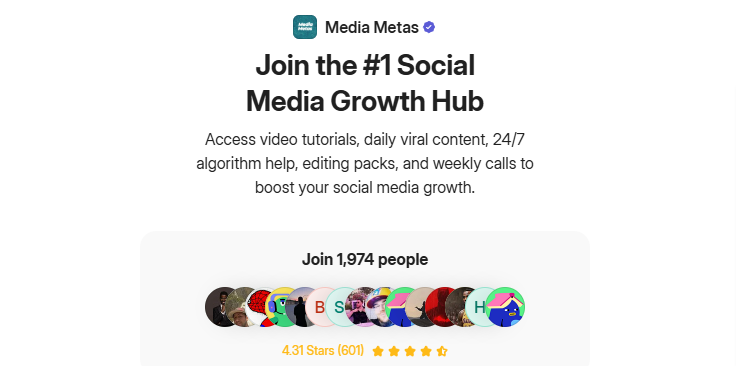
Guided Projects vs standalone Coursera courses
Earlier, we noted that the Guided Projects differ from the other Coursera courses.
You can read more about each of the course types in our Coursera review for learners. However, here’s a brief overview of how the Guided Projects are different from the standalone courses:
| Guided Projects | Standalone Coursera courses |
|---|---|
| Take 60-120 minutes to complete | Take up to 12 hours to complete |
| Taught mostly by instructors through the Coursera Project Network | Taught by partner colleges, universities, and organizations |
| Free or $9.99 | Free or from $49.99 |
| Available on demand | Available on demand |
| Hands-on practical project | Learn through videos and reading |
| Assessed via a graded quiz to check for understanding of the subject | Assessed via a mix of peer review, quizzes, and graded discussions |
| Certificate on completion/pass | Students who pay get a certificate |
Forget split screens and auto-marked quizzes. With Whop, you get to tailor a personal learning experience in a couple of easy steps with our flexible apps. Learn more about our Courses App in our guide.
How can you join the Coursera Project Network?

Interested teachers can apply by online form to join the network. The form asks you about your proficiency, notably:
✅ Teaching experience (this is preferred)
✅ Tools you are qualified to teach (Adobe Creative Suite, Power BI, etc.)
✅ Teaching language/s
The process involves uploading a 3 to 5-minute video of you teaching your subject. This can be something you record specifically for the application using something like QuickTime or Screencastify. Alternatively, you can use an existing video you’ve posted on YouTube or Udemy, etc., as long as it meets the criteria.
What happens once you’re accepted?
If your application is approved, Coursera reaches out to you about the next steps to develop your own Guided Projects. Coursera provides help with this, offering a range of resources.
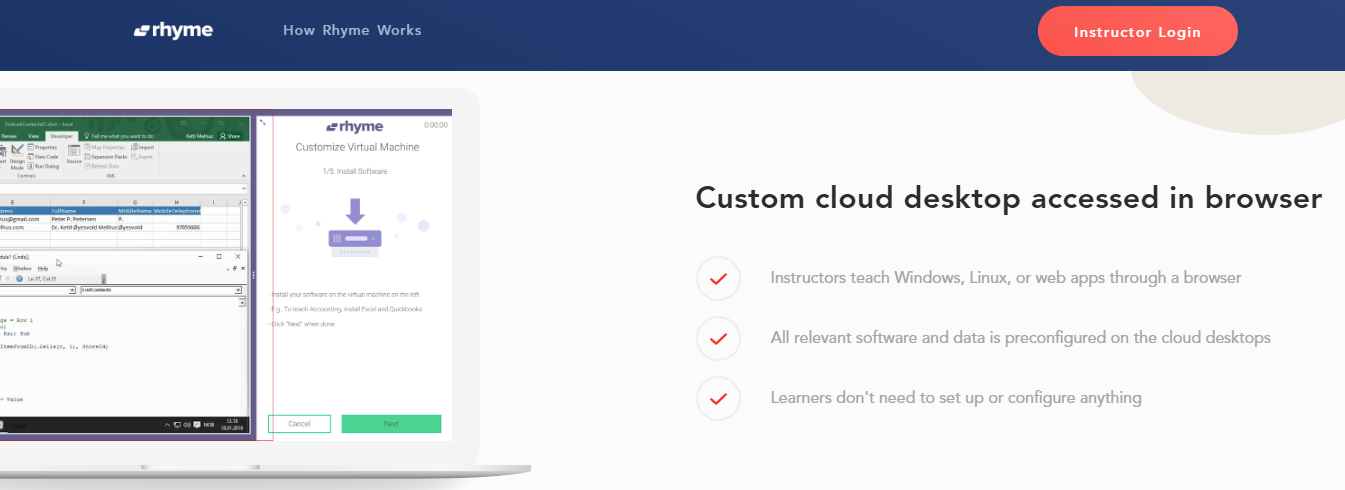
The courses are built using Rhyme. This is a platform that lets instructors create hands-on projects using the split-screen workspace.
How much can you earn on Coursera?
In terms of how much you can earn hosting Guided Projects, Coursera is tight-lipped on the dollar amount. Instead, it states that payment is made on a per-project basis and determined by factors including:
- Instructor experience
- Niche
- Volume of projects
In reality, this is not a place where you can expect to scale your e-learning offering and cash in as an expert in your subject. However, it might offer a supplementary income while helping you get your name out there as an instructor.
On Whop, you can find students who care more about your expertise than your teaching creds. Need proof? Here are just 2 of the 5-star reviews from satisfied students of the Content Academy:

Alternatives to the Coursera Project Network for teachers
As you can see, there are lots of limitations to the Coursera Project Network. If you want to teach or tutor academic subjects, languages, and other skills online, there are lots of alternative teaching platforms out there where professionals and non-professionals can sign up. A few to take a look at are:
- Whop
- Superprof
- iTalki
- Varsity Tutors
- Wyzant
You can offer teaching and tutoring (and sell related digital products) from your very own “whop”.
How else can you make money on Coursera?
If you’ve got a sizeable online audience and want to leverage Coursera to make money, you can join its affiliate program instead.
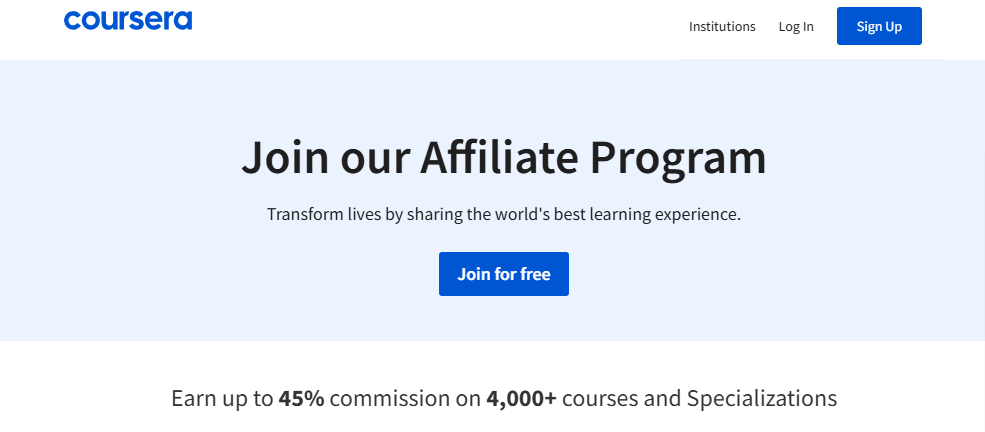
In all honesty, this might be the best option for creators, as anyone who publishes relevant content can apply to join. If approved, you can generate revenue by promoting one or more of the 4k+ eligible Coursera courses and programs, including:
- Guided Projects: The hands-on micro-courses we looked at earlier.
- Standalone courses: Single courses which take up to 3 months to complete.
- Specializations: Groups of related single courses that build to a single qualification.
- Professional Certificates: Career-based skills provided by companies like Google, IBM, and Meta.
- Coursera Plus: The platform’s subscription offering that lets students take multiple courses for a single monthly (or annual) price.
Commission isn’t paid on degrees, which are Coursera’s big-ticket items. However, Coursera has impressive conversion rates among students, a huge global reach, and strong name recognition, along with high-profile partnerships.
New to affiliate marketing? Check out our library of resources.
How much do Coursera affiliates make?
Coursera offers between 10% and 45% commission to its affiliates. What does this mean in practice?
Well, let’s take a look at what each of Coursera’s eligible course options costs learners and the commission you can earn on each sign-up.
| Program | Cost to learner | Affiliate commission |
|---|---|---|
| Guided Projects | $9.99 | 20% |
| Courses | From $49 | 20% |
| Specializations | From $49 a month | 45% |
| Professional Certificates | From $49 a month | 45% |
| Coursera Plus | $59/month or $300/year | 10% |
How to join Coursera’s affiliate program
Simply sign up and Coursera will review the application to make sure your content is relevant (i.e. has something to do with education). They will also look at your level of traffic and the quality of your content.
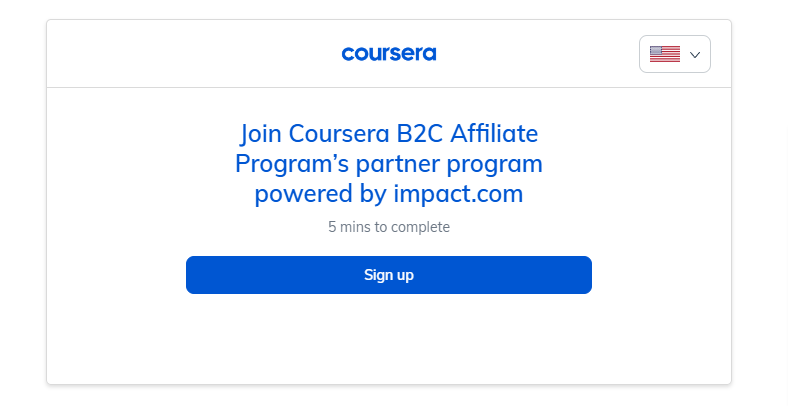
If approved, you get that all-important affiliate link that you can post within your website, blog, or social media content. You claim commission every time a user clicks on the link and signs up for one of the eligible Coursera courses within 30 days of clicking.
A few things to know before joining Coursera’s affiliate program and promoting its courses or subscription plan:
1. You only get paid commission once, even if the user signs up for a program or subscription with recurring monthly payments.
2. You can claim multiple commissions through one user if they sign up for more than one course using your affiliate link each time.
3. Many of the standalone courses have a free “audit” option, with students able to access the content for no money – they have to pay if they want a certificate at the end. You only get your commission if the students take the paid route.
Whop also has its very own affiliate program, with a potentially lucrative 30% commission for every creator referral.
Coursera for creators: Our verdict
As you can tell, Coursera is not a particularly viable course creation platform or a place to offer your online teaching services.
If you have the necessary background and skills, the Coursera Project Network does offer the opportunity to build authority and land you some extra income through Guided Projects. However, we flagged the limitations – mainly the topics you can teach and the split-screen learning style.
There is also a lack of personalization and opportunities to create and monetize related content, such as communities, ebooks, and one-on-one coaching.
For instructors who want to teach anything other than hands-on projects related to online tools and platforms, there’s not really any other way to go with Coursera. The only other option is the Industry Partnership route, but only eligible organizations can offer full courses via Coursera.
One thing to consider is the attractive affiliate program. This is worth considering if you publish quality content in a niche that supports what Coursera offers and you have consistently strong levels of traffic.
Overall, if you want to teach online or sell your own courses, you will need a platform that supports individuals and entrepreneurs in their e-learning ambitions, like Whop.
A summary of Coursera's pros and cons for creators
| Pros | Cons |
|---|---|
| ✅ Reputable name in e-learning | ❌ Limited options for creators/teachers |
| ✅ Can join the Coursera Project Network | ❌ Can only teach Guided Projects |
| ✅ Business partnerships | ❌ Low earning opportunities |
| ✅ Attractive affiliate program | ❌ Not a viable course creation platform |
Alternatives to Coursera for course creators
So, what are your options for a course creation platform? Let's take a look:
🏆 Whop
When it comes to making money in the e-learning space, Whop provides all the tools you need to create and scale. From the user-friendly platform to the built-in course builder, Whop is a one-stop shop for anyone who wants to sign up to teach, tutor, build online courses and communities, and much more.
The practical dashboard allows easy customization with Whop's apps. You can add your course with the Courses app, a space for your community to chat with the Chat app, and a 1-on-1 coaching service with the Video Calls app.
Cost: Free to start then from as little as 2.7% + $0.30 per sale.
Udemy
Udemy is a course creation platform that lets instructors sign up and offer on-demand video-based courses on a wide range of hobby and career-oriented subjects. It also supports things like quizzes and activities.
Cost: Free but Udemy keeps a percentage of instructors’ revenue.
Skillshare
Skillshare is another popular destination for teachers and course creators. Unlike Udemy, teachers must undergo an approval process before they can become instructors on the site. It focuses on creative, business, lifestyle, and tech skills.
Cost: Free (teachers are paid a share of the platform’s subscription revenue).
Thinkific
Thinkific is a learning platform that supports a range of online learning material, with a focus on courses, communities, and memberships. It offers a range of tools for creators to build and launch an e-learning offering via their own website.
Cost: Plans range from $36 to $374 a month (paid annually), with a limited free trial available.
Kajabi
Kajabi started out focused on course creation but has expanded to support other types of content. Again, this is a platform that supports creators in offering e-learning materials on their own website.
Cost: Plans cost between $55 and $319 monthly (paid annually), with a 14-day free trial available.
Teachery
Teachery is one of the newer sites for online course creation. It also supports things like memberships, ebooks, and other types of digital content. The platform has limitations in terms of its features, such as not being able to host live classes.
Cost: It has one plan priced at $49 a month, with a 14-day free trial.
Create, teach, and grow on Whop
Online education is such an attractive space for entrepreneurs as it also allows the sale of related digital products, such as:
✅ Ebooks
✅ 1-on-1 coaching & mentoring
At Whop, we support all this and more, so you have unlimited potential to grow your audience and monetize your content – all in one place.
Take advantage of our seamless payment processing and community-building features. Whatever stage of your journey to financial freedom you find yourself at, we’re here for you.
Come and join our ever-growing base of creators who are using their knowledge, passion, and experience to live their dream of online entrepreneurship.


